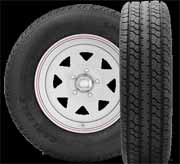Trailer tires have a tough life. Drivers are unlikely to feel any notable differences in road noise or road feel with trailer tires. Trailer tires are often subjected to harsh curb hits and road bumps. Tandem axle tires also experience harsh scrubbing due to making tight turns in parking lots and on corners.
 Trailer tires are quite different from traditional passenger car and truck tires. Trailer tires are not designed for either tractive effort or steering adhesion. The tread design is not optimized for ride comfort or noise reduction. Most importantly, the side walls are designed to reduce trailer sway and provide optimum control.
Trailer tires are quite different from traditional passenger car and truck tires. Trailer tires are not designed for either tractive effort or steering adhesion. The tread design is not optimized for ride comfort or noise reduction. Most importantly, the side walls are designed to reduce trailer sway and provide optimum control.
The two biggest enemies to trailer tires are abrasion and heat. As trailer tires heat up, their structure begins to disintegrate and weaken. The load capacity gradually decreases as the heat and stress caused by higher speed increases.
As with any tire, trailer tires have a “shelf life.” Time weakens a trailer tire too. Three to five years is the projected life of a trailer tire. Obviously, the type of use and number of duty cycles influences the service life of the tire. Weight carried and speeds driven are the biggest factors influencing tire life. In approximately three years, roughly one-third of the tire’s strength is gone.
The mileage life of a trailer tire is generally 5,000 to 12,000 miles. Which tires should you use? Trailer tires should match each other, and the load rating should ex-ceed the combined weight of the trailer and load by about 20 percent.
What is a tire with a rating of “ST”?
“ST” tires feature materials and construction to meet the higher load requirements and demands of trailering. The polyester cords are bigger than they would be for a comparable “P” or “LT” tire.
The steel cords have a larger diameter and greater tensile strength to meet the additional load requirements. “ST” tire rubber compounds contain more chemicals to resist weather and ozone cracking.
Always inflate trailer tires to the maximum inflation indicated on the sidewall. Check inflation when the tires are cool.
If the tires are hot to the touch from operation, add three psi to the max inflation.
Under inflation is the number one cause of trailer tire failure. An under inflated tire will flex needlessly, and run much hotter than a fully inflated tire.
Keys to Avoiding Trouble from Carlisle tire
- The ideal storage for trailer tires is in a cool, dark garage at maximum inflation.
- Use tire covers to protect the tires from direct sunlight.
- Place thin boards or plywood sections between the tire and the
pavement. - Clean the tires using mild soap and water ONLY.
- Do not use tire-care products containing alcohol or petroleum distillates.
- Inspect the tires for any cuts, snags, bulges or punctures.
- Check the inflation before towing and again before the return trip.
- Replace trailer tires every three to five years, whether they look like they’re worn out or not.
Trailer Tire Warranty
- The Carlisle trailer tire warranty applies to the original purchaser for three years from the date of purchase or until the tread depth reaches 3/32″.
- The OE (original equipment) warranty goes into effect at the time of the trailer purchase
 Please email all inquiries to: Dave
Please email all inquiries to: Dave
or snail mail
32 Turkey Hill Road
Richmond VT 05477

Leave a Reply